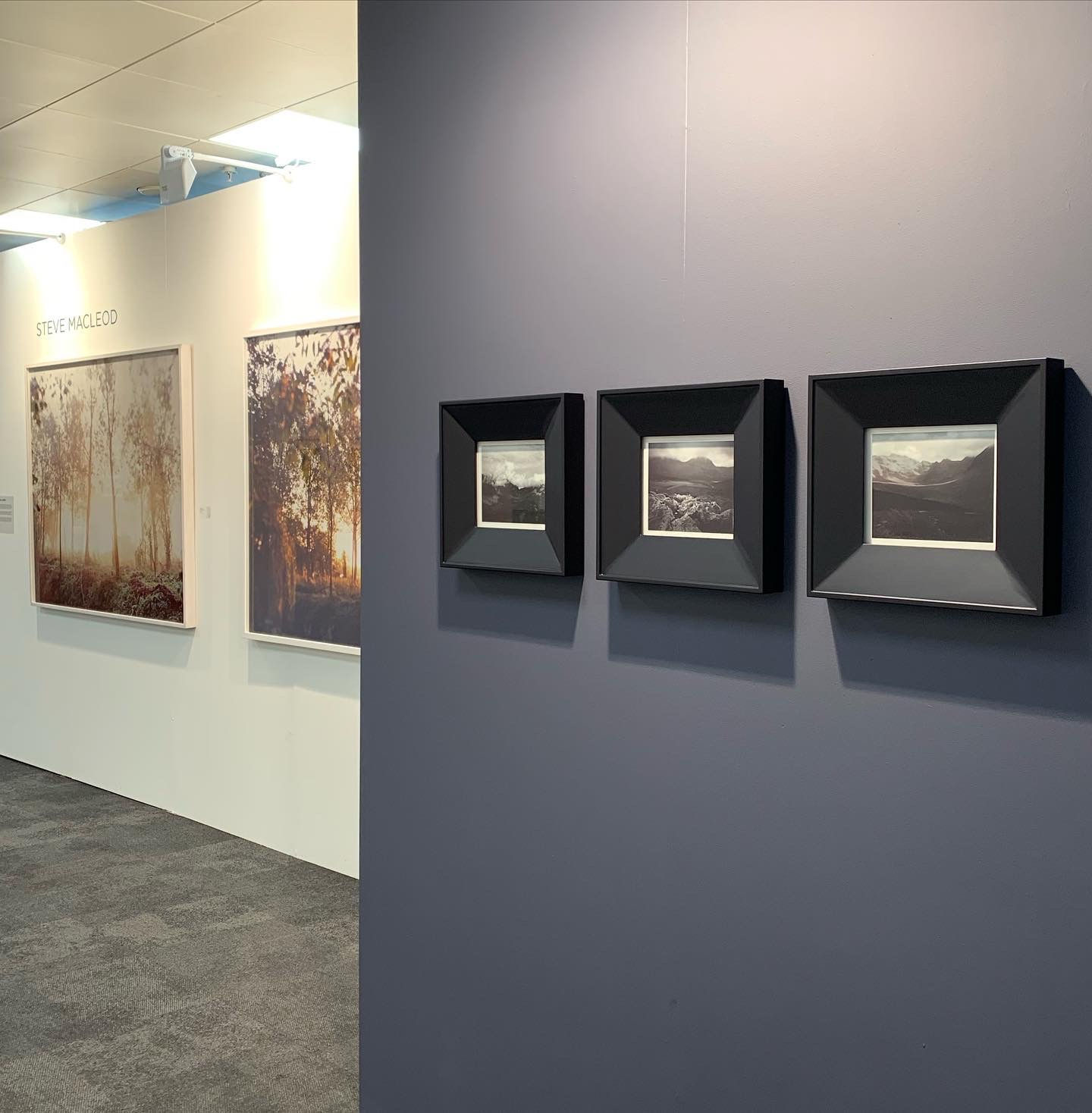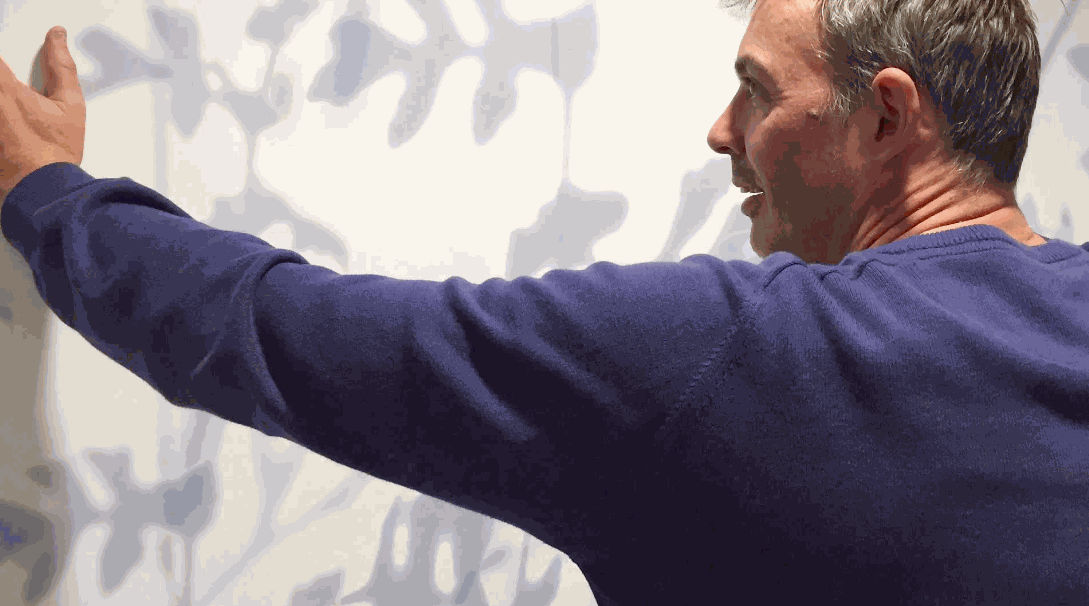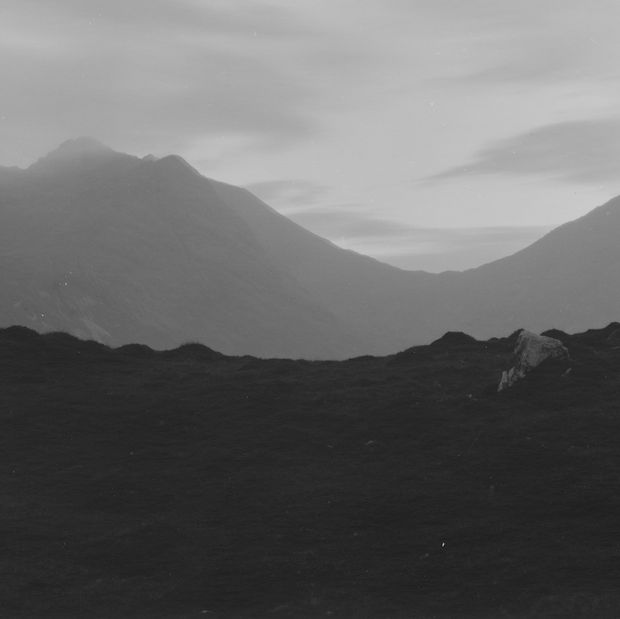-
Indigo
Steve Macleod -
The indigo dreams had subconsciously worked their way into Macleod's art in the same way that memories weave in and out of our thoughts.
Indigo never started as an artistic endeavour. Instead it was borne out of recurring dreams Steve Macleod experienced during a traumatic health crisis, images and scenes would revisit the artist as landscapes of dark inky blues and hazy purples - colours often associated with deep cognitive depressive states. The recurring landscapes were not places the artist had visited in his native Scotland nor were they past memories being recalled.
Macleod keeps a diary of writing and drawing that he uses to consider and flesh out his creative ideas in word and image. Several years later, Macleod noticed the patterns in his landscape work were reminiscent of mountain ranges in the Scottish Highlands. The indigo dreams had subconsciously worked their way into his art in the same way that memories weave in and out of our thoughts. Macleod was unconsciously reconstructing something that once terrified him, but at the same time he was inextricably drawn to, manifesting as Indigo.
The Indigo series was shot on film and hand printed by the artist in the darkroom. Each work is an archival silver gelatin print toned in hot selenium, presented in a handmade bespoke artist frame and produced in a limited edition of three unique iterations of each image.
-
-
 Steve Macleod's diary pages and hospital notes.
Steve Macleod's diary pages and hospital notes. -
In Dreams
Through the landscapes of Indigo, Macleod surrenders his own emotional state and offers the viewer space to interpret and consider their own personal experiences.
Dreams are a universal human experience, many times embodying similar attributes or themes across populations, cultures and time. Steve Macleod recounts recurring dreams of dark, purple and blue coloured mountains just beyond his reach during one of the most consequential moments of his adult life. These images remained with him upon awaking and continued to linger for years to come.
Mountain imagery has significant meaning, specifically in the realm of dream interpretation. A mountain can symbolise overcoming an obstacle, rising above, a subconscious knowledge of having the resources and ability to conquer hardship and achieve a goal. Seeing mountains at a distance can mean a new adventure on the horizon. The inverse of this is a vision of descending a mountain, which could symbolize withdrawal or taking a step back.
From a spiritual outlook, a mountain is thought to inhibit divine inspiration, transcendence and a nearness to God. In Greek mythology the gods sat in their palace atop Mount Olympus. Moses climbed the mountain to commune with God and returned with the 10 Commandments. The Sermon on the Mount is one of the most quoted gospels of Jesus in the Christian faith, forming the guiding ethics a Christian is to embody. These few references are not insignificant in their potential impact for shaping civilization and understanding our place within the world.
Peaks and basins layer the horizon line in the compositions of Indigo, mirroring the progress and setbacks inherent in the human experience. Through the landscapes of Indigo, Macleod surrenders his own emotional state and offers the viewer space to interpret and consider their own personal experiences.
-

Image: Steve Macleod, Diary Page
-

Image: Detail of Steve Macleod's Indigo 11, 2019.
-

Image: Detail of Steve Macleod's Indigo 10, 2019.
-
ABOUT THE COLLECTION

Indigo is a collection of archival silver gelatin prints toned in hot selenium, presented in a handmade bespoke artist frame and produced in a limited edition of three unique iterations of each image, as follows:
Steve Macleod
The series Indigo, 2019
Silver gelatin print toned with hot selenium
20 x 25 cm
Unique iterations of 3 + 2 artist proofs
£ 1,500 framed inclusive of VAT of 20% where applicable
Works from the Indigo series are presented in a dark-blue bespoke artist's frame with museum glaze.All prints are signed, dated and numbered by the artist.
*Please note prices and availability are subject to change without prior notice.
**All prices are quoted as framed and inclusive of VAT unless otherwise noted.Please contact the gallery for more information or to arrange a viewing of works by Steve Macleod.
We can be reached via email or directly by telephone on +44 753 444 9706.
-
ABOUT THE ARTIST
BIOGRAPHY
Professor Steve Macleod is inspired by the Pictorial movement popularised in the late 19th and early 20th centuries. For a Pictorialist, a photograph, like a painting, drawing or engraving, is a way of projecting an emotional intent into the viewer's realm of imagination. His works often utilise chiaroscuro elements of light and shade creating a melancholic, expressive mood.
His practice operates in a zone that discards the modernist approach to 'scientific' realist interpretation for one that references Tonalism (a progressive school of American landscape art from 1880-1920) - often on the periphery of vision, one experiences environmental aura rather than a topographical recording of nature - visual metaphors describe historical and humanist subjects that connect us with the environment we inhabit.
His work suggests, rather than explains, inviting the viewer to question rather than understand, and in doing so breaking the rules for what is readily accepted as 'metric' landscape photography. He aims to recreate the impression of what we experience with the eye and less so by the camera lens. The lens records, the eye creates.
Macleod uses nature to share the conceptual impact and influence it can have on our emotions; our health and our imagination. He belongs to the landscape he photographs, immersed in the environment, there has to be definite motive in making exposures. One that is drawn from and driven by something deeper than technical counsel. Motivated by light and season, the images he captures reside as metaphors for deep-seated meaning and reflection, often in conflict with the atmospherically beautiful images he creates.

Steve Macleod was diagnosed with Bipolar II in 2000 and continues to experience severe episodes which are characteristic of the condition. Macleod is open about his own condition and doesn't shy away from advocating frank discussion about the impact of mental health on individuals, those around them and society as a whole. Macleod's conditions do not define him, but he uses it to inform and support his own arts practice. Macleod also dedicates time to working with mental health charities especially those that use the arts and creativity to dispel stigma and support others who also suffer from mental health conditions.
Macleod is also an educator - a regular lecturer and speaker on photography subjects he is a respected industry professional with decades of experience. He is a Visiting Professor at Univeristy of Suffolk; a Trustee of the Queen Elizabeth Scholarship Trust (QEST); on the Patrons Board at the National Portrait Gallery, London; a Trustee on the Board for National Open Arts and Lifetime member of Frontline Club in London. He also runs a successful mentorship programme for emerging artists.
Represented by Black Box Projects, Macleod regularly exhibits and works are held in both private and public collections.
Indigo: Steve Macleod
Past viewing_room























